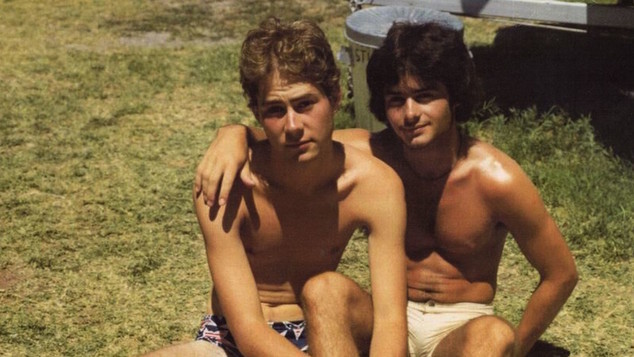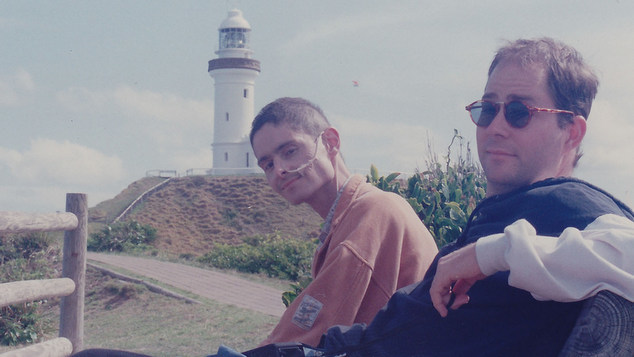
The story of Timothy Conigrave and his partner John Caleo has captivated Australian audiences since Tim’s posthumous autobiography ‘Holding the Man’ was released in 1995.
The true story of two young guys who fell in love while they were students at a Catholic High School, has gone on to be a bestselling book, a successful play, and last year it became an award winning film.
Yet there is lots more to know about Timothy and John’s journey. A new documentary ‘Remembering the Man’ looks at their 16 year long relationship from a different perspective.
Documentary filmmakers Nickolas Bird and Eleanor Sharpe interviewed many of the couple’s closest friends to discover more. The filmmakers also gained access to photographs and videos of the couple that have not been seen before.
One of the people featured in the documentary is Franco di Chiera. Franco was a long term friend of the couple and shared a house with Tim and John when they first found out they were HIV positive.
Franco, who is now a successful documentary filmmaker himself, spoke to OUTinPerth about the time he spent with Timothy Conigrave and John Caleo.
‘Remembering the Man’ is screening at LUNA Leederville at 6:30pm on Monday May 30th. The screening will be followed by a Q&A with Franco di Chiera. Click here for all the details.
Meeting Tim and John
I was a film school and I was managing a short film for a director who knew Tim and brought him up from Melbourne to star in the film.
He came up with another actor from Melbourne. The film was about a plane crash that only had two survivors. On the way to southern Lake Eyre, which is where we were going to shoot it all, the director decided he no longer required Tim’s services.
So he was at a bit of a loose end, and we couldn’t just dump him in the middle of nowhere. So he came along with us and sort of became my assistant. We formed a relationship, and in face we had a bit of an affair.
He went back to Melbourne after that, and obviously John wasn’t too pleased about it all, but John also came up to Sydney on the odd occasion because Tim eventually got into NIDA.
We kept up our friendship, and that’s all it was at that stage, and I met John and I thought he was the most beautiful creature, and the most wonderful person – although he really wouldn’t talk to me.
But over time we got to know each other, and when he finished studying in Melbourne – he was studying to be a chiropractor – bu then we’d all become friends and we decided to live together. So they was me, Tim, John, and also Ben Drayton who was a young and budding DJ on the gay scene. It was the four of us.
Tim and John find out they are HIV positive
It was during that time that quite a few people that I knew who were working in the AIDS area had encouraged me to go and have the test. Their argument was that you needed to know your status, because even though there wasn’t a cure for AIDS, at least if you were looking after yourself it might increase your chances of survival until they found a treatment.
I had a friend who was a psychologist and a councilor at the AIDS Clinic on Albion Street, and with some persuasion I went and had my test. It came back negative and I told the boys and they debated among themselves about whether they wanted to know and if they should go.
Eventually I think they felt that it was important, and I think Tim also by this stage had started to work with street kids who had been exposed to AIDS. I think he thought it was important that he knew his status at least if he was dealing with them.
They both went along to the AIDS clinic and had their test and when they went back for the results they came home rather distraught.
They were told individually. One was told they were clear, which was John and Tim was told that he had been infected. Then just as they were about to go John was called in and was told ‘Look there’s been a mistake, actually yor file has been misread and your positive as well.’
When they came home, they were very upset. Tim asked me if I really was antibody negative and I said ‘Yes I am’ and said ‘Why did you ask?’ and he said, ‘We just thought maybe you hadn’t told us because you didn’t want to worry us, while we were waiting for our test’ and I had to say, ‘No, no I am [negative]’
It was really sad and upsetting. They were crying and I went and gave them a hug and a kiss on the lips because around that time people were treating like lepers. People wouldn’t touch forks, or knives or glasses or share things with people who had AIDS.
I guess I was a little more educated because I had friends who were working at the AIDS clinic so I wasn’t so paranoid, but I also wanted them to know that at least I didn’t feel that way about them, that they could somehow rely on me.
I said let’s make a cup of tea, and I went out and bought a cake. We sat down and had tea, I think it calmed them down a little bit, and then they just went back to their room and laid down, and I could hear them talking for hours, I could hear tears and so on. It was really devastating.
That really commenced the long journey for both of them in dealing with the AIDS infection and the subsequent disease and it was really difficult.
The reality of the AIDS epidemic
During this time we were losing friends left right and centre. I was virtually going to funerals every month. Every day you’d open the newspaper and discover more people had died.
The Star Observer, the gay newspaper in Sydney, came out once a week and it started having a few obituaries and then it grew to a page, then several pages and I remember one time I counted about twenty pages.
It was just devastating because you saw the faces that you recognised from when you went out, people you saw on the street, you’d be shocked.
I lost about seven friends, and some of those were also friends of Tim and John’s. So it was really difficult for them to have to confront the death of friends and confront their own mortality, because they had been infected a John was developing AIDS at that time.
The reaction to AIDS really propelled Tim to want to do something about it and educate people. They’d experienced the usual sort of prejudices but also difficult family dynamics, especially in John’s case. All of that has been told in quite a lot of detail in Tim’s book ‘Holding the Man’ and also the play, and also the film, and now the documentary.
Dealing with grief
I do think it’s important to say this, I remember when things turned bad- we were no longer living together at this point, they really needed their own space, but I still saw them often, all their friends really rallied around them and were very wonderful.
I remember going to see Tim when they lived in Rose Bay, John was really sick at that time and in hospital. I remember him telling me about John’s father’s reaction and then discussing John’s possessions and he was really upset.
I can understand completely why he was livid about it, but I think what the film and the book tells is Tim’s experience.
From Tim’s point of view that was his experience, that’s what he saw and that he recounted, I understand that completely and I don’t take that away for one minute.
But, the reality is that John’s father was also going through grief. When people die people can behave very oddly and strangely, they can be angry and they can act irrationally.
I did say to Tim, ‘I understand how you feel and why you must feel so upset, but I can’t help but feel this is related to John’s Dad’s grief about what’s coming,’ but that didn’t really console Tim, and he was entitled to feel angry.
The legacy of Timothy’s work
How do you at the legacy that Tim has left behind with a book that has gone on to be a play and a movie.
It was a best-seller in Australia for six months and it wasn’t just gay people who read it.
It’s a book that really hits home with people, whenever I see a copy in a second hand book shop I buy it and give it to someone, I constantly giving copies of ‘Holding the Man’ to people.
I used to do that too, and I know lots of people who have done that. It’s become a passage to gay history and to know what people have had to put up with. I think that is a lasting legacy and one to be proud of.
Their story is about love and their total devotion to each other.
In the context of all these debates about gay marriage it really renders all the negative arguments into the area of rationality. It’s very clear that this wasn’t about having sex, this was two people loving each other. The devotion they showed each other would stand up against any heterosexual couple, and against any couple that exists in this world. We are no different.
I think that why the story really resonates right now, I mean – they were married. That shows their devotion, sure they had their ups and down, but there’s no doubt that they showed incredible love for each other and who could argue with that.
Do you ever think about what they’d be doing today if they were still with us?
I moved to Melbourne, and part of the reason was I had so memories from Sydney about that period and I found it very difficult. Everywhere you went you were reminded of friends who had passed away. I found that rather difficult.
I found it a relief to move to Melbourne, but Tim and John had told me so many stories about Melbourne so when I go on a walk I remember little places that they mentioned to me. On those walks I think about them.
If they were here today they’d be doing what all of us are doing, living their lives and dealing with the challenges of life and sharing good time as well as the bad.
The tragedy is that they were taken away so young and so many gay people were. Now I have friends who are dying of other things, and that brings back so many memories of the AIDS period.
I think they were just unlucky they lived at a time before there were better treatments. I and so many others are still here but it could have just as easily have been me or someone else. That’s why it was so hard to see people being judged for having AIDS.
I do find myself thinking about what they would be like, and I do have conversations with them in my head at times… They’re still with us and they haven;t been forgotten. Even if there hadn’t been a book, a play or a film, we’d still be thinking about them because they were a big part of our lives at a definitive time.
Graeme Watson interviewed Franco di Chiera.





